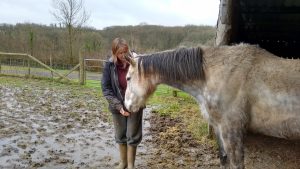By Kathie Gregory

© Kathie Gregory
What is often missing in the horse human relationship is “conversation.” In many instances, communication with a horse often involves telling him what to do. If he does not comply, he is told again, sometimes in a stronger manner, which may also include force or punishment. Unfortunately, taking the time to listen to what a horse is saying, to understand him and adjust for his response, is usually a strategy more often employed when working with dogs than horses. Whilst some horses are seen as companions and treated as such, others are seen merely as tools to do a job, or facilitate the success of a person in achieving a competitive goal. I would say the dog world is ahead of the horse world in terms of welfare, understanding behavior and training methods. As such, many canines now enjoy the benefits of ethical, positive, force-free solutions along with the latest scientific research on how the mind functions, that enables those who work with dogs to do so in a way that achieves good performance results whilst ensuring the dog is strong and healthy, both physically and emotionally. Sadly, this ethos has yet to reach the horse world as a whole, with aversive methods still prevalent in many cases. Read more.
